Key takeaways:
- Effective event budgeting requires meticulous planning, understanding hidden fees, and maintaining a contingency fund to handle unexpected expenses.
- Collaboration and transparency within the team enhance event execution, allowing members to contribute ideas for cost-saving measures.
- Continuous monitoring and prioritization of budget allocations are essential for adapting to emerging needs and avoiding overspending.
- Implementing techniques such as zero-based budgeting and using budgeting software can greatly improve financial control and visibility over expenses.
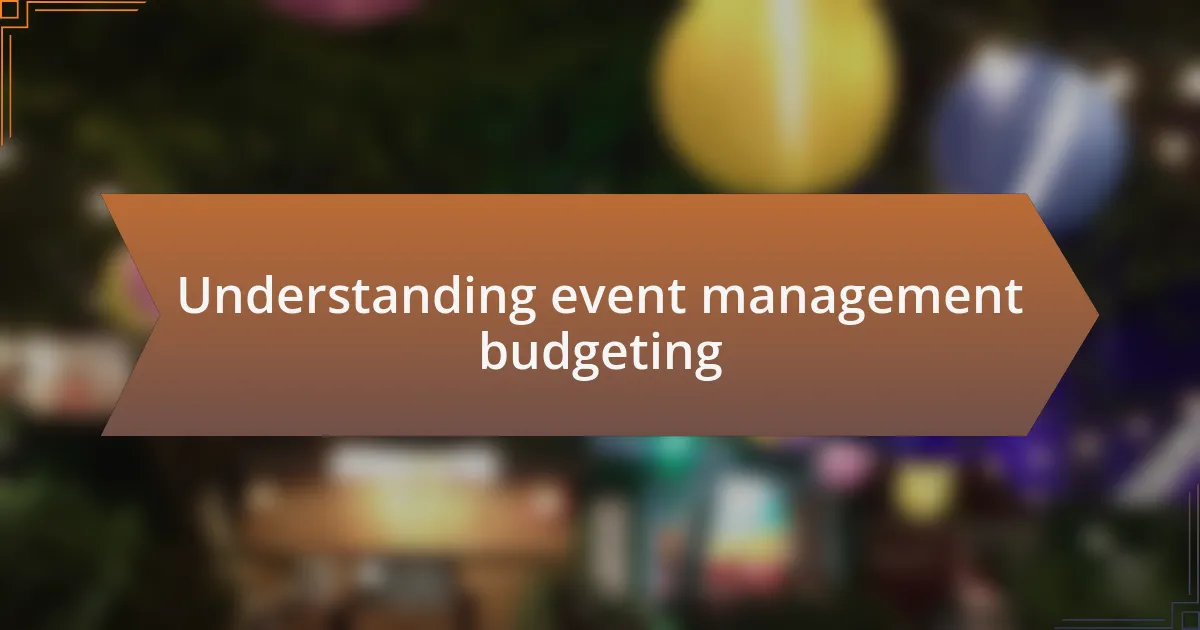
Understanding event management budgeting
Understanding the nuances of event management budgeting is crucial for a seamless event experience. When I first dove into this field, I underestimated how quickly costs could spiral out of control. Have you ever been surprised by last-minute expenses that weren’t in your budget? I certainly have, and it taught me the importance of meticulous planning and tracking every cent.
One powerful lesson I learned involved unexpected costs in venue selection. I once secured a beautiful downtown location, only to discover there were hidden fees: security, setup, and even overtime charges. It was a wake-up call. Now, I always ensure to clarify every potential charge during negotiations because a well-informed budget prevents many headaches down the line.
Finally, I can’t stress enough the value of contingency funds. It may seem like extra work, but having a buffer has saved me multiple times. Whenever unexpected expenses arise, I don’t break a sweat; I simply dip into that reserve. What about you? Have you ever faced a surprise that could have been cushioned by a little foresight? Embracing the unpredictable elements of event planning not only eases stress but also enriches the overall experience.
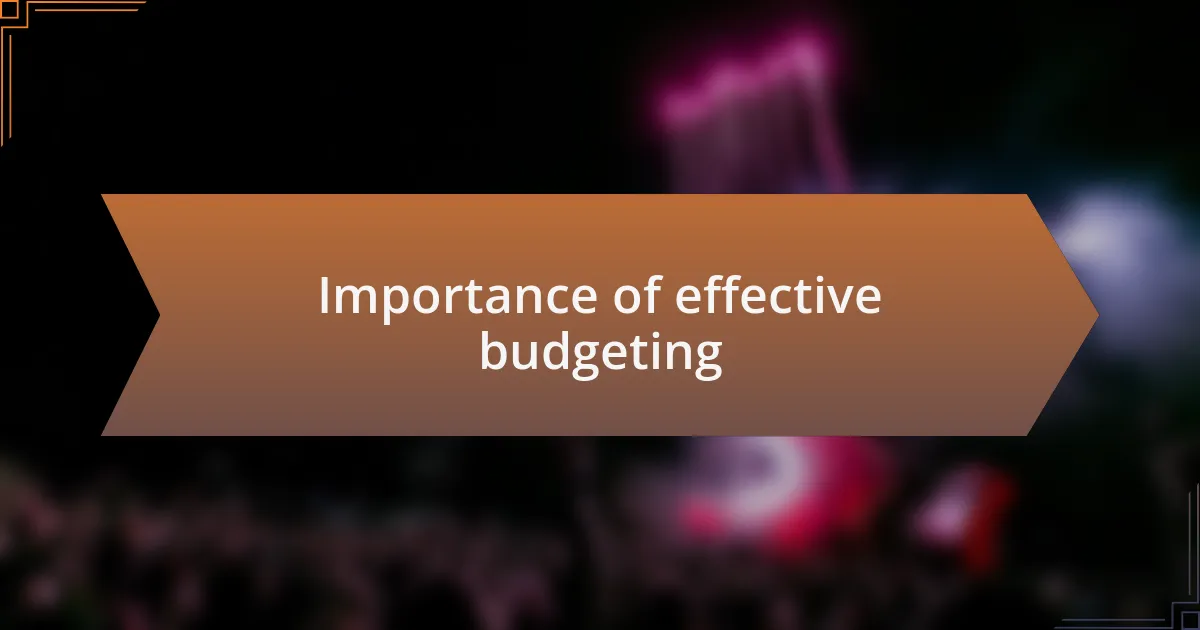
Importance of effective budgeting
Effective budgeting serves as the backbone of any successful event. I distinctly remember a festival I organized where budgetary oversights nearly derailed everything—I underestimated the impact of catering fluctuations, which led to a frantic scramble for additional funds. Have you ever faced a similar situation where a lack of financial foresight forced you to make tough decisions? It’s those moments that taught me just how essential it is to anticipate costs rather than react to them.
Beyond just numbers, budgeting also fosters creativity and resourcefulness. On one occasion, faced with a tight budget for decorations at a wedding, I turned to local artisans instead of conventional suppliers. This not only saved money but also added a unique touch to the event. Isn’t it fascinating how constraints can sometimes spark our most innovative ideas? In a way, effective budgeting can lead you to uncharted territories of creativity, turning financial limitations into exciting opportunities.
Moreover, I’ve found that effective budgeting encourages better team collaboration. When everyone is on the same page about financial limits, it creates a sense of shared responsibility. I recall a project where open discussions about budget constraints led to team members pitching in their own ideas for cost-saving measures. The result? A strong camaraderie and a beautifully executed event. Have you noticed how communication around budgets can strengthen team dynamics? It’s remarkable how transparency can align efforts towards a common goal.
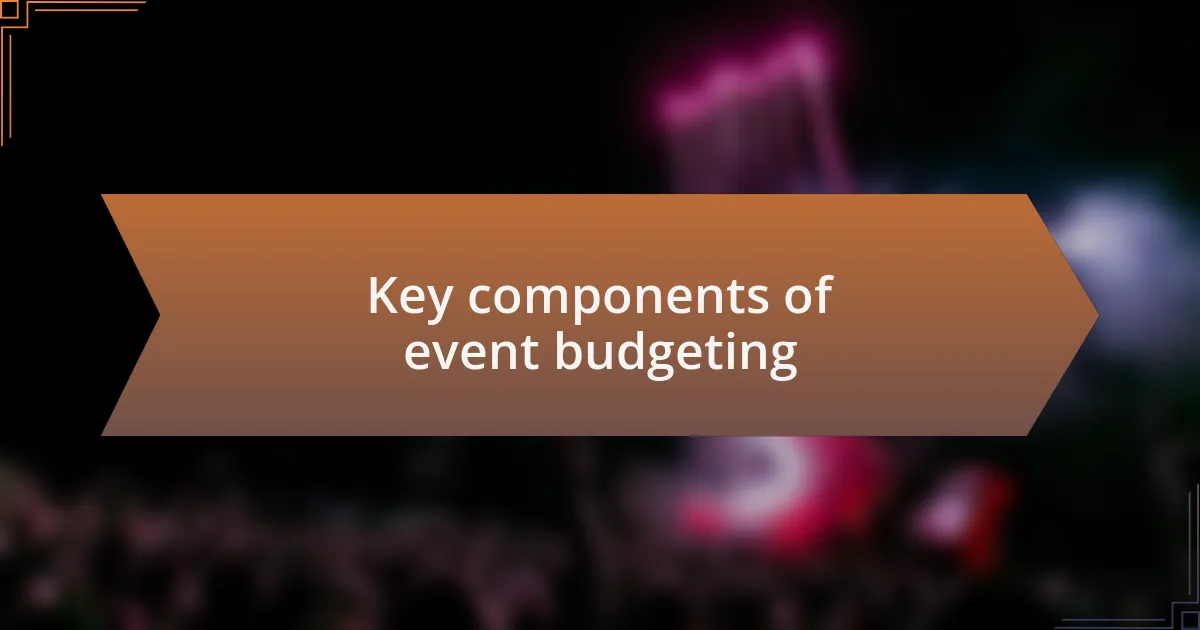
Key components of event budgeting
When it comes to event budgeting, accuracy is crucial. One critical component is estimating costs for every element, from venue rental to entertainment. I recall an event where I simply didn’t account for the unexpected fees associated with audio-visual equipment. This oversight taught me the importance of detailed quotations and contingency planning—after all, have you ever found yourself scrambling at the last minute because you realized you didn’t budget for something significant?
Another key component is prioritization. Understanding which aspects of the event are essential versus those that can be adjusted is vital. I once had to reallocate funds from lavish centerpieces to invest more in a high-profile speaker whose presence elevated the event’s credibility. This choice not only impressed attendees but also underscored the value of making informed decisions based on impact. Isn’t it empowering to know how a strategic shift can amplify the overall experience?
Finally, continuous monitoring and adjustment are essential to successful event budgeting. During a large corporate retreat, I kept a close eye on expenses as the event progressed. This vigilance allowed me to reassign funds dynamically, address wastage, and avoid overspending. Have you practiced monitoring your budget in real-time? It felt like having a financial compass guiding me through the complexities, ensuring that I stayed on course while navigating the unexpected twists that always seem to arise.
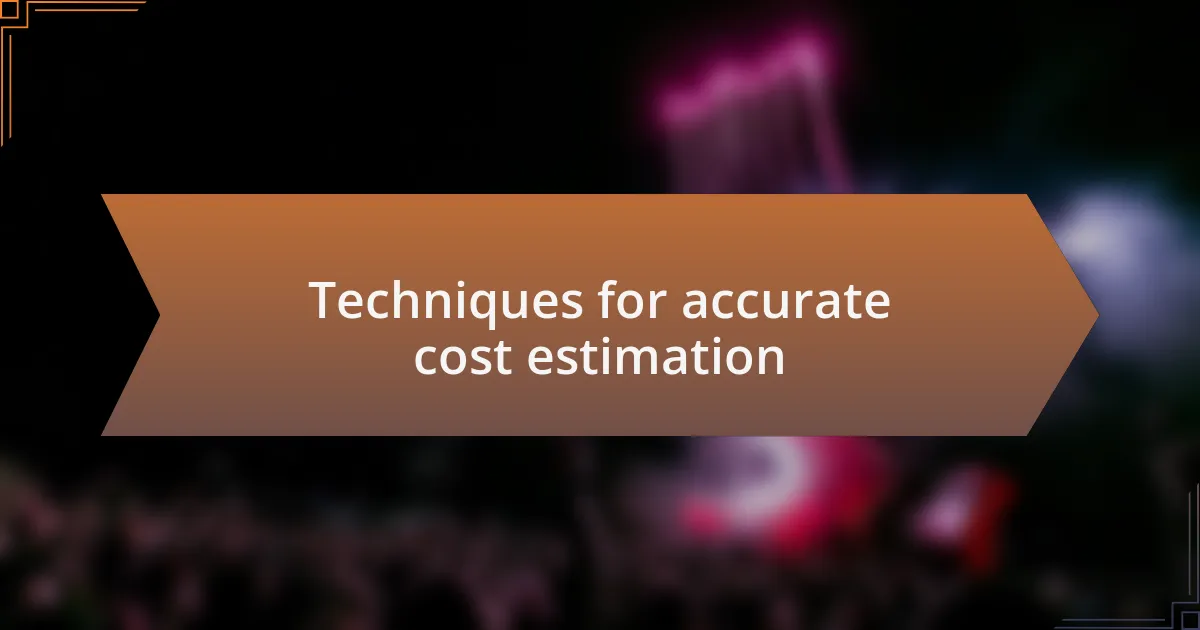
Techniques for accurate cost estimation
When estimating costs for an event, I highly recommend breaking down the budget into smaller, manageable categories, such as venue, catering, and entertainment. In one memorable event planning experience, I adopted this technique and found clarity in my expenses. By using detailed spreadsheets, I realized that the catering costs were significantly higher than projected, leading to a crucial negotiation with the vendor. Have you ever felt that moment of relief when you discover potential savings before it’s too late?
Another technique that has served me well is to engage in thorough market research. I once spent time comparing quotes from different suppliers for decor and discovered some vast discrepancies in pricing. This not only enhanced my bargaining power but also built a network of trustworthy vendors who provided quality within budget constraints. How often do we overlook the value of asking around and doing a bit of homework?
Lastly, I’ve learned the hard way that incorporating a buffer into the budget is essential. In my early days of planning events, I often underestimated costs, which led to financial strain. Now, I add a contingency of around 10-15%, ensuring I’ve got the flexibility to handle unexpected surprises without panicking. Isn’t it comforting to know that a little foresight can save you from unnecessary stress later on?
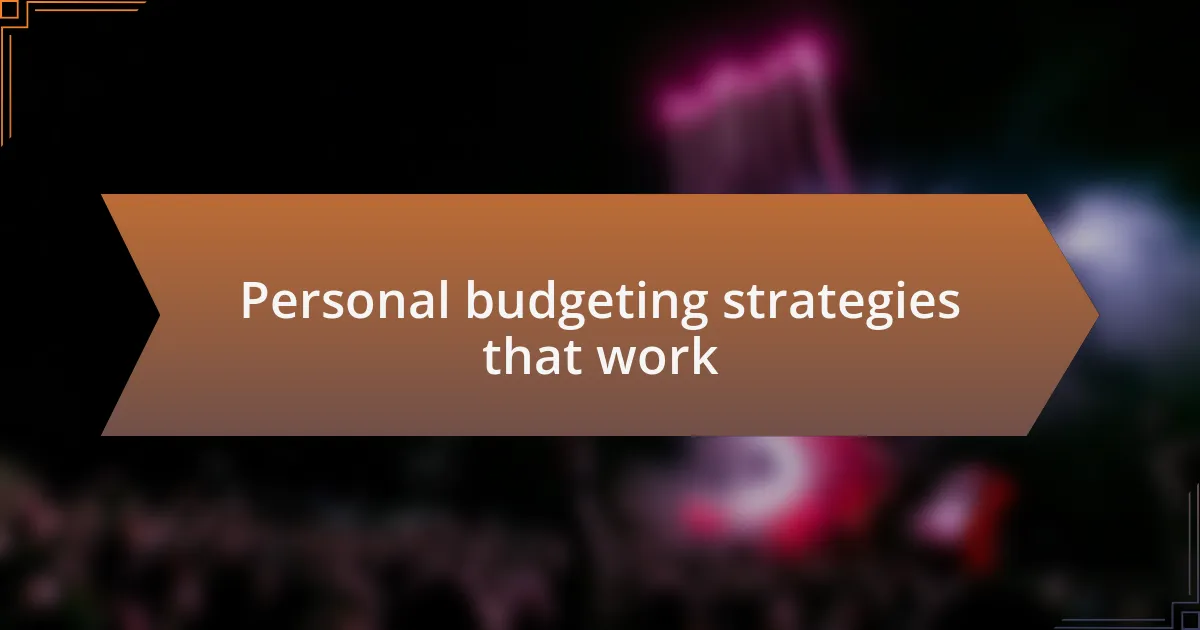
Personal budgeting strategies that work
When it comes to personal budgeting strategies that work, one of my most effective methods is the zero-based budgeting approach. I remember a time when I meticulously allocated every dollar to a specific purpose at the start of each month. This not only helped me track my expenses but also made me feel in control of my finances. Don’t you think it’s empowering to see exactly where your money goes?
Another strategy I’ve found incredibly beneficial is setting up separate accounts for different spending categories. A few years ago, I opened a dedicated account for event-related expenses, which allowed me to visualize my budget in real time. It became clear how much I could afford to spend on decor or entertainment without touching my savings. How often do we wish for that kind of clarity in our finances?
Lastly, I swear by the practice of reviewing my budget weekly. I used to check in on my spending sporadically, which led to some surprises at the end of each month. Now, I take a moment each week to assess my progress and make necessary adjustments. Doesn’t it feel like taking the reins when you proactively manage your finances?
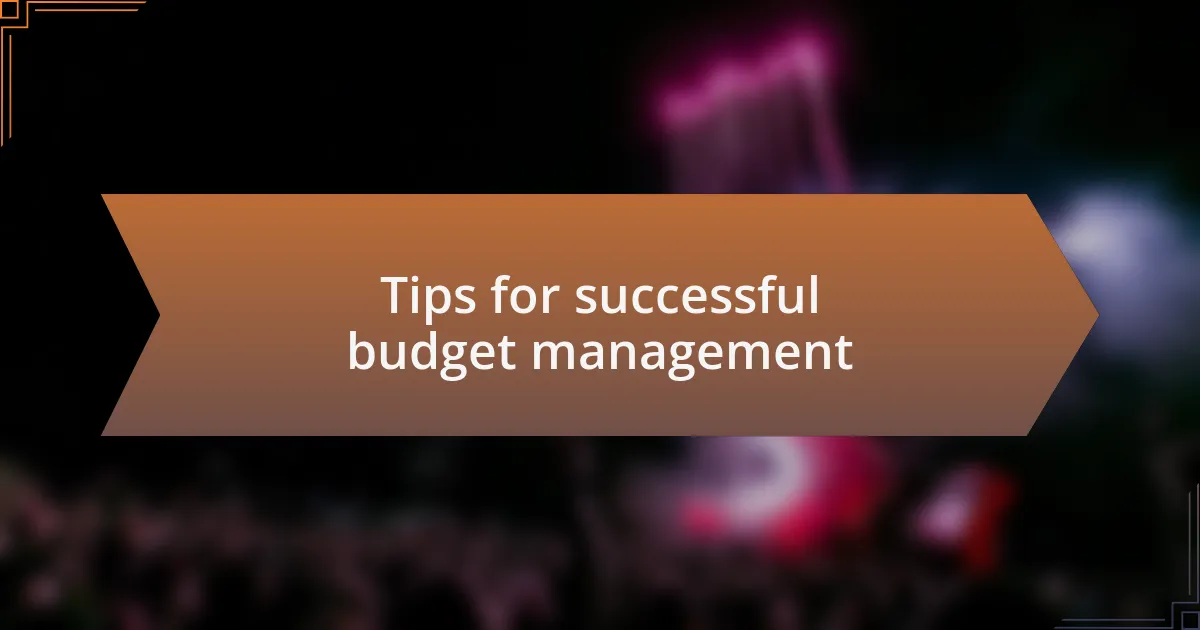
Tips for successful budget management
One tip that I’ve found invaluable for successful budget management is the practice of prioritizing needs over wants. When organizing an event, I learned the hard way that it’s easy to get caught up in luxury items. I once splurged on extravagant centerpieces that ultimately detracted from the guest experience. Reflecting on that, I realized how essential it is to focus first on the necessities. Isn’t it satisfying to know that your budget is going toward the elements that truly matter?
Another effective strategy I’ve employed is using budgeting software or apps to track real-time expenses. During my last event planning venture, I experimented with an app that allowed me to log my expenses as soon as they occurred. This instant feedback helped me stay within budget by visually demonstrating how much I had left to spend. Automatically having that data at my fingertips made a significant difference. Don’t you think having an instant snapshot of your financial position is a game changer?
Lastly, I always leave a small buffer in my budget for unexpected costs. I vividly remember an event where an unforeseen venue fee popped up. Thankfully, since I had planned for surprises, I was able to address the issue without stress. This cushion has saved me more than once. Can you imagine the peace of mind that comes with being prepared for the unexpected?